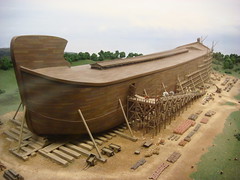
Here is the second part of my series. Here I will discuss the 4th point:
4. Asking them to
prove there is no
God is logically errant because you can't prove a negative.
I think that this is a disgenuous
play on words, so let's flip it and asks can they disprove a positive? In other words, "Can one disprove that that there is a God?" When you apply the question the God of the
Bible, you can disprove His existence if you can prove that the Bible is false. If the Bible is false then we have to toss out everything it says. It's not God-breathed and should be ignored. The issue is that I have searched and looked for holes in the Bible and can't find one. So let's look at one of the attempts made in the past month by
atheist I've interacted with in the past month. I made point that there is good
evidence for the Bible being true. When challenge to provide it, I gave
10 archaeological finds that support the Bible. Also thanks to the
Apologetics 315 blog I found the following quote
“It may be stated categorically that no archaeological discovery has ever controverted a Biblical reference. Scores of archaeological findings have been made which confirm in clear outline or exact detail historical statements in the Bible. And, by the same token, proper evaluation of Biblical descriptions has often led to amazing discoveries.”
- Nelson Glueck
The ten I provided are just the tip of the
iceberg there is way more evidence than that.
 Necessary Being: A being whose existence is no mere accident or contingent result but whose very nature is to exist necessarily. God has traditionally been understood as a necessary being, and it is this aspect of the concept of God that underlies the ontological argument for God's existence. A necessary being can be defined (following Gottfried Leibniz) as one that exists in every possible world.
Necessary Being: A being whose existence is no mere accident or contingent result but whose very nature is to exist necessarily. God has traditionally been understood as a necessary being, and it is this aspect of the concept of God that underlies the ontological argument for God's existence. A necessary being can be defined (following Gottfried Leibniz) as one that exists in every possible world.![Reblog this post [with Zemanta]](http://img.zemanta.com/reblog_e.png?x-id=aab14e29-feef-40ac-9480-bcabd57d4787)


![Reblog this post [with Zemanta]](http://img.zemanta.com/reblog_e.png?x-id=255a1820-4870-493a-ae94-2957b32d14d9)

![Reblog this post [with Zemanta]](http://img.zemanta.com/reblog_e.png?x-id=6e8a7c77-d80b-45c2-87d0-19bdf8b573d9)

![Reblog this post [with Zemanta]](http://img.zemanta.com/reblog_e.png?x-id=c3caaf65-4538-4a0d-8022-244bd03a2055)